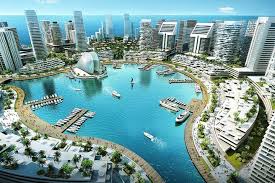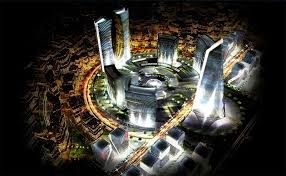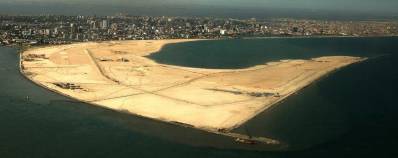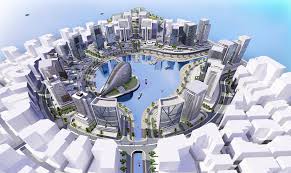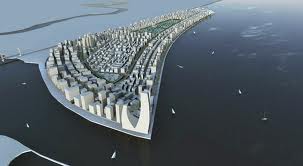Recently Industrialist from India, China, Indonesia partnered with a Nigerian textile company to promote the export of their products to Nigeria. Textile business in Nigeria is beginning to gain momentum.
Nigeria’s position in the African textile industry is one that cannot be easily shoved aside when narrating the history of textile business in Africa. The Nigerian textile industry was the pride of the nation. As at 1985, there were about 180 functional textile mills employing about a million people. The Nigerian cotton and textile industry was in the 1980s a key player in the national economy. The Textile industry then generated an annual turnover of 8.95 billion Dollars, with an average of 25 per cent of the sector’s gross domestic product (GDP) accounting for not less than 10 per cent of corporate income taxes. Nigeria was ranked the second largest textile hub in Sub-Saharan Africa behind South Africa which represented 63 per cent of the textile capacity in the West African sub-region. The sector however suffered neglect in the late 1980s and with that went the Nigerian pride.
In Nigeria “fashion is a way of life”. Over the last decade Nigerians have become more fashion conscious and fashion forward than any other African country hence the demand for textile in the country has continue to increase. It is no longer new to see variety of textiles being incorporated into western wears, bags, shoes, belts, jackets, household decorations etc. Every fashion piece or item in Nigeria is an attempt at making a fashion statement.
When it comes to textile business in Nigeria, Aba, is one name that is common on the lips of textile business men and women. Aba is the biggest textile market in the country. The town located in the eastern part of Nigerian over the last decade has remained a major player in the Nigerian textile industry and a destination for purchasing textile in Nigeria, hence, majority of Nigerian fashion designers, interior decorators, tailors, textile business owners etc. source for textiles in Aba especially when dealing with large quantity.
The Nigerian Textile Industry has remained untapped since the 1980’s. The opportunities in Nigerian textile industry are boundless and abundant. Recently the Nigerian Bank of Industry in a bid to proof their support towards the industry released N100billion Naira for the promotion and revival of the textile industry in Nigeria.
The Nigerian common in the last couple of years have come to realise the profitability level of this industry hence their recent promotion of the industry and call for foreign investors to assist in building the industry.
It is however pertinent to note that the Nigerian textile industry isn’t exactly free of its challenges. Although man-power is in abundance, the supply of power in the country has however remained a challenge. Industries operating in the country depend on generators as their major source of power. The cost of production in Nigeria is higher compared to other countries where there is a constant power supply and due to this the cost of textile in Nigeria is higher as opposed to purchasing it in countries where they are not being manufactured
One also cannot deny the effect importation of foreign textiles into the country is having on production of Nigerian textiles. Despite all these challenges, Investors however are being encouraged by the Nigerian government to relocate here and invest as well help with the repositioning and revitalization of the textile industry.
The increase in the demand of textiles in Nigeria is an occurrence that cannot easily be over looked. Although demand is on the rise meeting the supply has remained a challenge in Nigeria. Most industries in a bid to meet demand despite with the high cost of production have being forced to reduce the quality of materials being produced.
Recently Intrasolutions blog interviewed Dr. Julius Nwokoro one of Nigeria’s foremost Turkish-Nigeria business owner and the CEO of ULTRA Moda a textile business company with over 15 years of experience. He spoke about the industry, the challenges and opportunities in the industry.
Below are excerpts from the interview
Q: Can you give us some basic background information about yourself
I am one of the pioneers of business between Turkey and Nigeria. I started textile business as a student in Turkey. As student back then I usually brought to Nigeria materials from Turkey for sale during the summer holiday. Back then trade marks were not in place hence it was easy to bring in the materials into the country as the policies on importation were more friendly then. That has changed as Turkish materials now compete with textiles from other countries hence the need to use a trade mark making it more difficult to move Turkish materials into the country.I have been running this business for more than 15 business.
Q: Why did you choose Textile Business?
As young man I was a fashion conscious man, I was a dresser and based on this my friends advised that I start a fashion business hence my venture into the textile business. As a student in Turkey the textile sector then was more flexible towards us and it was easy for me to venture into it. I remember Asara big market that had so many manufacturers who were looking for people to partner with they were the first to welcome foreigners to do business with them hence it was easy for me to have access to textiles in Turkey as a student. Back then fashion was an international affair and textile was universal it needed no technical training like learning the Turkish language to get to understand it so it was easy venture into that business as well as sell the textiles due to the high demand.
Q: What are your biggest challenges as a Nigerian business man in Turkey?
Doing Textile business with Turkey was easy up until the introduction of Chinese textiles into the Nigerian market. The Chinese textiles were relatively cheap, their credit facility was high, they could import containers of textiles into Nigeria without an initial deposit from the buyer and it was difficult to have such a relationship with the Turkish textile companies . However people like myself stuck with the Turkish textile because of their quality which is far better than the Chinese textile.
Q: what opportunities does a Turkish company have in Nigeria?
This business is very profitable right now in Nigeria. We have about 150 million people in the country which we see as a large market for any business. The Nigerian climate is another advantage which favours textile industries in Nigeria, due to the humidity we tend to change our clothes as often as possible and hence this has increase demand in textiles. An average Nigerian loves to dress. Nigerians love to travel, we all over the world and due to this we have copied diverse fashions which have been incorporated into our fashion sense in the country and this automatically has led to an increase in demand for textiles in Nigeria.
There is a large labour market here hence a Turkish company moving to Nigeria doesn’t have to bother about relocating expats from their home country to run the business in Nigeria.
Q: Does the urban market (which is one of the biggest textile market in Africa) have so much effect in Nigeria especially in cities like Lagos and Abuja?
Yes, it does but it has more effect in native/African materials which is in high demand and is more competitive in Nigeria. Although in past times the urban market use to compete with the sewing of safari suits and so on and so forth however the cost of production has slowed that down hence their demand is now in the production of African dresses.
Q: why do you think we import more rather than manufacture textiles in Nigeria?
One of the major challenges in Nigeria is the power sector. Most companies depend on generators to work hence the cost of production is higher in this country as opposed to importing the goods from oversea. Secondly there is the psychology of Nigerians preferring goods manufactured abroad as opposed to a good manufactured here, hence a typical Nigerian would rather purchase a textile manufactured abroad.
Q: What should be the expectations of Nigerians who are looking to deal with Turkish companies?
Turkish companies are looking to grow their company, create room for more credit facility between them and their partners, establish branches in countries, have new partners. Turkish partners prefer to have partners located in other countries running their business for them rather than them moving into a country to run the business with them. They find it more economical as this reduces the cost of migrating to a new terrain and getting use to a new culture. Nigerians should be able to meet this criteria to in order to effectively work with a Turkish company.
Q: What should Turkish companies expect from Nigerians?
Partnering with Nigerian companies gives you more advantage to grow your business faster as you have access to more opportunities and a bigger market. Trust is built between partners from both countries and they can benefit from each others’ companies as well as their networks. Nigerians are forward thinkers.
Q: As a long time traveller between these two countries do you thing we have enough supportive laws between both countries that is supporting e-commerce and trade between in both countries.
Yes. Back in the days most Nigerian business men traveling to Turkey had to travel via connecting flight. They had to travel with KLM from Nigeria to Emirates and then to Turkey. But with the introduction of direct flights from Lagos to Turkey it has been cheaper and easy to fly to Turkey. It is a major improvement in the relationship between both countries and most Nigerians especially the business men see this as a big step towards promoting business between both countries.
However, in recent times there has being drastic increase in the air freight of this airline, the price is almost as high as the price of flying to America which is 12hours away from the country and most Nigerian business men who fly the route regularly see this as a challenge.
Q: Describe the textile relationship between both countries and what is your biggest concern in this Sector?
Textile business is booming very well now in Nigeria, however Nigeria in a while has been unable to compete with Turkey as they are one of our biggest producers. I however see this as a perfect opportunity for companies to move to Nigeria to invest In the Textile Industry and have access to a market share in Nigeria which has not yet been flooded.
One major concern between both countries is the issue of trust and relationship between partners. Also majority of Nigerians have the opportunities but lack the finances to invest in the textile business, if only they can have access to more credit facilities from their Turkish counterparts following the long years of bilateral trade between both countries.
In conclusion it is important that we mention that Turkey is one of the major player and exporter of textile into the country. Currently, the bilateral trade between Nigeria and Turkey stands at $1.3 billion, and is expected to rise to $2 billion (N320 billion) by the end of 2013. Hence, an investment of Turkey in the textile industry would mark a new beginning for both countries in this industry and Turkey would most likely enjoy a monopoly of the industry for a long time.




























